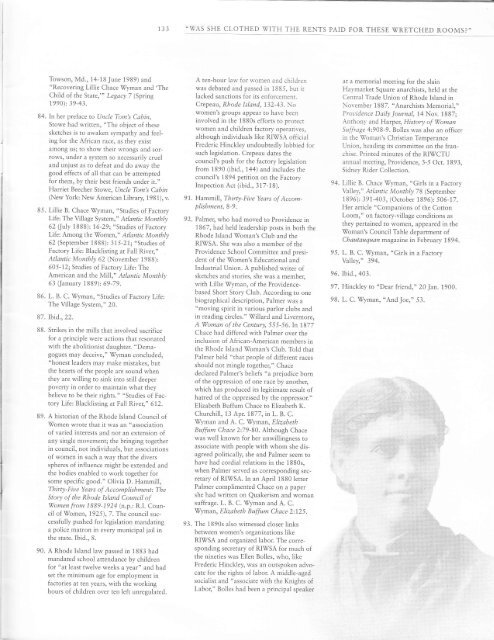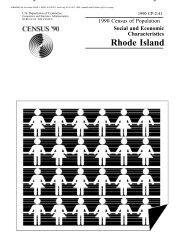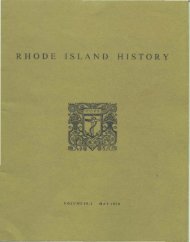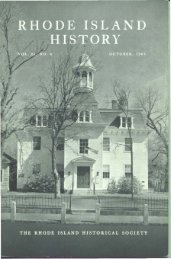Untitled - Rhode Island Historical Society
Untitled - Rhode Island Historical Society
Untitled - Rhode Island Historical Society
Create successful ePaper yourself
Turn your PDF publications into a flip-book with our unique Google optimized e-Paper software.
Towson, Md., 14-18 June 1989) and<br />
"Recovering Lillie Chace Wyman and 'The<br />
Child of the State,"' Legacy 7 (Spring<br />
7990\:39-43.<br />
84. In her preface to Uncle Tom's Cabin,<br />
Stowe had written, "The ob ject of these<br />
sketches is to arvaken sympathy and feeling<br />
for the African race, as they exist<br />
among us; to show their wrongs and sorrows,<br />
under a system so necessarily cruel<br />
and unjust as ro defeat and do away the<br />
good effects of all that can be attempted<br />
for them, by their best friends under it."<br />
Harriet Beecher Stowe, Uncle Tom's Cabin<br />
(New York: New American Library, 1981), v.<br />
85. Lillie B. Chace \Wyman, "studies of Factory<br />
Life: The Village System," Atlantic Montbly<br />
62 (July 1888): 16-29; "studies of Factory<br />
Life: Among the \fomen," Atlantic Monthly<br />
62 (September 1B88):315-21; "Studies of<br />
Factory Life: Blacklisting at Fall River,"<br />
Atlantic Monthly 62 (November 1988):<br />
605-12; Studies of Factory Life: The<br />
American and the Mill," Atlantic Monthly<br />
63 (January 1889): 69-79.<br />
86. L. B. C. \Wyman, "Studies of Factory Life:<br />
The Village System," 20.<br />
87. rb|d.,22.<br />
88. Strikes in the mills that involved sacrifice<br />
for a principle were actions that resonated<br />
with the abolitionist daughter. "Demagogues<br />
may deceive," \7yman concluded,<br />
"honest leaders may make mistakes, but<br />
the hearts of the people are sound when<br />
they are willing to sink into still deeper<br />
poverty in order to maintain what they<br />
believe to be their rights." "studies of Factory<br />
Life: Blacklisting at Fall Riveq" 612.<br />
89. A historian of the <strong>Rhode</strong> <strong>Island</strong> Council of<br />
'Women wrote that it was an "association<br />
of varied interests and not an extension of<br />
any single movement; the bringing together<br />
in council, not individuals, but associations<br />
of women in such a way that the divers<br />
spheres of influence might be ertended and<br />
the bodies enabled to work together for<br />
some specific good." Olivia D. Hammill,<br />
Thirty-Fiue Years of Accomplishment: The<br />
Story of the <strong>Rhode</strong> lsland Council of<br />
Women from 1889-1921 (n.p.: R.I. Council<br />
of rWomen, 1,925),7 . The council successfully<br />
pushed for legislation mandating<br />
a police matron in every municipal jail in<br />
the state. Ibid., B.<br />
90. A <strong>Rhode</strong> <strong>Island</strong> law passed in 1883 had<br />
mandated school attendance by children<br />
for "at least twelve weeks a year" and had<br />
set the minimum age for employment in<br />
factories at ten years, wrth the working<br />
hours of children oyer ten left unregulated.<br />
133 .\TAS SHE CLOTHED \(/ITH THE RENTS PAID FOR THESE WRETCHED ROOMS?"<br />
91<br />
92<br />
93<br />
A ten-hour law for u'omen and children<br />
was debated and passed in 1885. bur it<br />
lacked sanctions for its enforcemenr.<br />
Crepeau, <strong>Rhode</strong> <strong>Island</strong>,132-43. No<br />
women's groups appear to have been<br />
involved in the 1880s efforts to protect<br />
uomerr and children facrory operarire..<br />
although individuals like RIWSA otficial<br />
Frederic Hinckley undoubtedly lobbied for<br />
such legislation. Crepeau dates the<br />
council's push for the factory legislation<br />
from 1890 (ibid., 144) and includes the<br />
council's 1894 petition on the Factory<br />
Inspection Act (ibid., 317-18).<br />
Hammill, Thirty-Fiue Years of Accomplisbment,<br />
B-9.<br />
Palmer, who had moved to Providence in<br />
1,867,had held leadership posts in both the<br />
<strong>Rhode</strong> <strong>Island</strong>'Woman's Club and the<br />
RI\7SA. She was also a member of the<br />
Providence School Committee and president<br />
of the Women's Educational and<br />
Industrial Union. A published writer of<br />
sketches and stories, she was a member,<br />
with Lillie Wyman, of the Providencebased<br />
Short Story Club. According to one<br />
biographical description, Palmer was a<br />
"moving spirit in various parlor clubs and<br />
in reading circles." \{/illard and Livermore,<br />
A Vloman of the Century,555-56. In IB77<br />
Chace had differed with Palmer over rhe<br />
inclusion of African-American members in<br />
the <strong>Rhode</strong> <strong>Island</strong> Woman's Club. Told that<br />
Palmer held "that people of different races<br />
should not mingle together," Chace<br />
declared Palmer's beliefs "a prejudice bor:n<br />
of the oppression of one race by anotheq<br />
which has produced its legitimate result of<br />
hatred of the oppressed by the oppressor."<br />
Elizabeth Buffum Chace to Elizabeth K.<br />
Churchill, 13 Apr. 1877, in L. B. C.<br />
Wyman and A. C. \fyman, Elizabeth<br />
Buffum Chace 2:79-80. Although Chace<br />
was well known for her unwillingness to<br />
associate with people with whom she disagreed<br />
politicalln she and Palmer seem ro<br />
have had cordial relations in the 1880s,<br />
when Palmer served as corresponding secretary<br />
of RIWSA. In an April 1880 letter<br />
Palmer complimented Chace on a paper<br />
she had written on Quakerism and woman<br />
suffrage. L. B. C. $7yman and A. C.<br />
'Wyman, Elizabeth Buffwm Chace 2;125.<br />
The 1890s also witnessed closer links<br />
between women's organizations like<br />
RI\flSA and organized labor. The corresponding<br />
secretary of RIVSA for much of<br />
the nineties was Ellen Bolles, who, like<br />
Frederic Hinckley, was an outspoken advocate<br />
for the rights of labor. A middle-aged<br />
socialist and "associate with the Knights of<br />
Labor," Bolles had been a principal speaker<br />
at a memorial meeting for the slain<br />
Haymarket Square anarchists, held at rhe<br />
Central Trade Union of <strong>Rhode</strong> <strong>Island</strong> in<br />
November 1 887. "Anarchists Memorial,"<br />
Prouidence Daily Journal, 14 Nov. 1887;<br />
Anrhony and Harper, History of 'Woman<br />
Suffrage 4:908-9. Bolles was also an officer<br />
in the Vbman's Christian Temperance<br />
Union, heading its committee on the franchise.<br />
Printed minutes of the RI\7CTU<br />
annual meeting, Providence, 3-5 Oct. 1893,<br />
Sidney Rider Collecrion.<br />
94. Lillie B. Chace V/yman, "Girls in a Factory<br />
Valley," Atlantic Monthly 78 (September<br />
1896)t 391-403, (October 18961: 506-17.<br />
Her article "Companions of the Cotton<br />
Loom," on factory-village conditions as<br />
they pertained to women, appeared in the<br />
'Woman's Council Table department of<br />
Cbautauquan magazine in February 1894.<br />
95. L. B. C. \Wyman, "Girls in a Factory<br />
Yalley," 394.<br />
96. Ibid.,403.<br />
97. Hinckley to "Dear friend," 20 !an. 1900.<br />
98. L. C. \fyman, "AndJoe," 53.











